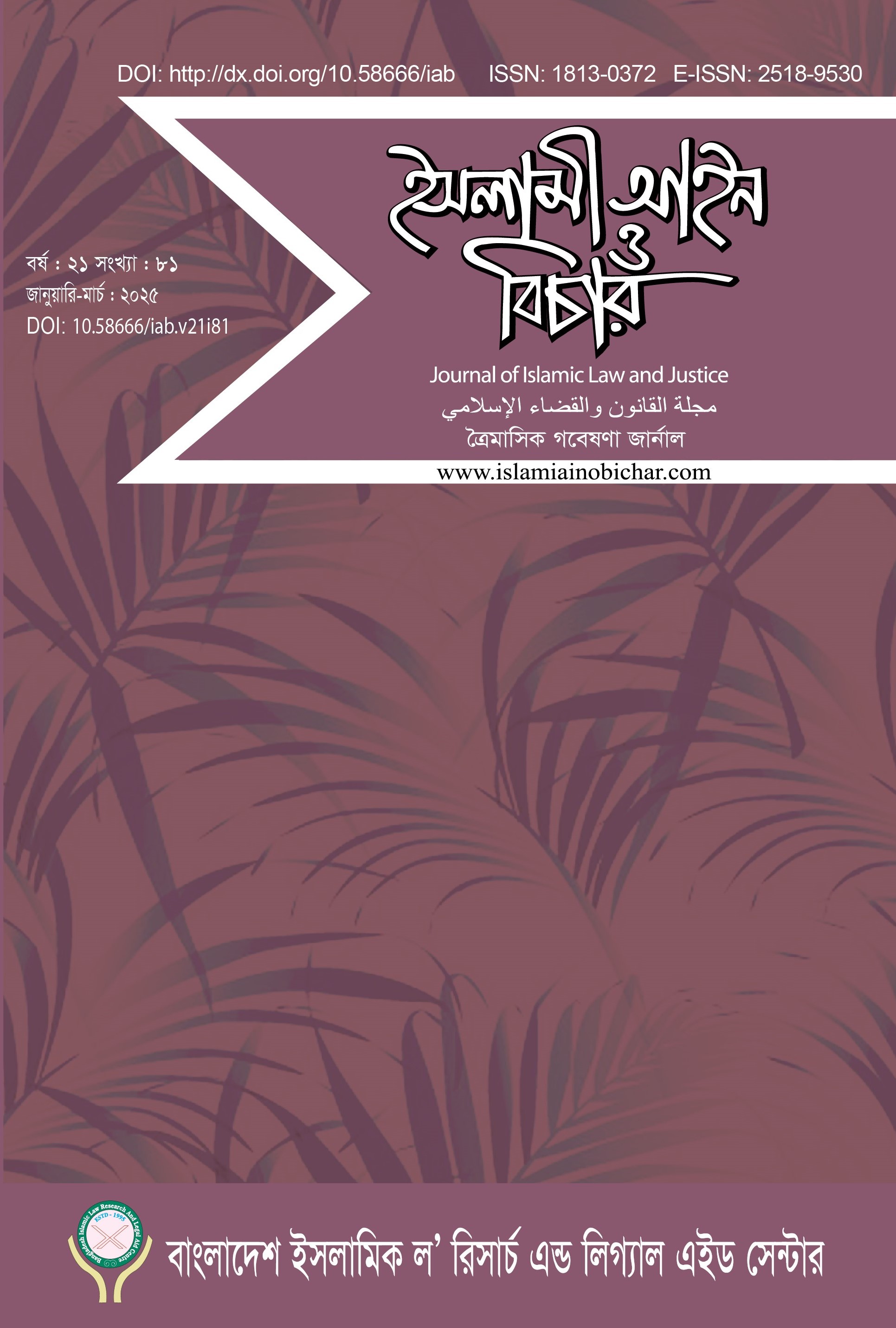বাড়ি ভাড়া সংক্রান্ত বাংলাদেশের আইন ও ইসলামী দৃষ্টিকোণ : পরিপ্রেক্ষিত ঢাকা|House Rent Laws in Bangladesh and Islamic Perspective: A Study in the Context of Dhaka
DOI:
https://doi.org/10.58666/iab.v21i81.293Keywords:
House rental, Landlords, Tenants, Islam, Dhaka, বাড়িভাড়া, বাড়ির মালিক, ভাড়াটিয়া, ইসলাম, ঢাকাAbstract
In Dhaka, the capital city of Bangladesh, housing affordability remains a significant concern, particularly for low-income and middle-income groups. Studies indicate that the poor often pay a higher proportion of their income on housing compared to middle-income individuals. For instance, Dhaka dwellers spend approximately 40% of their household income on housing, despite earning less than middle-income households. Islam encourages fairness in all financial transactions, so the rental price should be reasonable and not exploitative. It also important that the landlord fulfills their responsibility in keeping the property and providing it in a habitable condition, as per the agreement. The tenant, in turn, must adhere to the terms of the lease and take care of the property during the tenancy. In the context of Dhaka, the capital of Bangladesh, the rental market can be competitive and varies widely depending on location, size and amenities. In Islamic culture, Dhaka, like other cities, encourages ethical business practice to promote mutual respect and understanding between landlords and tenants. As with any rental agreement, both parties should priorities trust, justice and the observance of Islamic principles to avoid exploitation and ensure a harmonious relationship. Renting in Dhaka, therefore, should be viewed through an ethical lens where both parties uphold their rights and responsibilities with integrity.
সারসংক্ষেপ : ঘনবসতিপূর্ণ শহরাঞ্চলে বিশেষত ঢাকা শহরের আবাসনের জন্য বাড়ি ভাড়া বৃদ্ধি একটি গুরুতর সমস্যা। প্রতিনিয়তই বাড়ি ভাড়া আশংকাজনকভাবে বেড়ে যাচ্ছে। স্বল্প ও মধ্য আয়ের মানুষের এটি বড় আকারের সমস্যা হয়ে দাঁড়িয়েছে। বিভিন্ন কারণে বাড়ি ভাড়া বৃদ্ধি পাচ্ছে। বাণিজ্যিক ক্রিয়া-কলাপ, বাড়ির ইউটিলিটি পরিষেবার মান, গ্যাস, পানি, বিদুৎ, বাড়ির সৌন্দর্য, বাড়ির পরিবেশ, আবাসন কর, উন্নত যোগাযোগ ব্যবস্থা, শিক্ষা প্রতিষ্ঠান, বাড়ি থেকে রাস্তার দূরত্ব, সামাজিক অবস্থান, নিরাপত্তা, মহল্লার বৈশিষ্ট্য ও অন্যান্য সুযোগ সুবিধার দ্বারাও বাড়ি ভাড়া প্রভাবিত হয়। অঞ্চলভেদে ঢাকা শহরে বাড়ি ভাড়া কেমন হবে তা নির্ধারণ করে সিটি করপোরেশন একটি তালিকাও প্রকাশ করেছে কিন্তু সেই তালিকা মানছেন না কেউ। আর তা বাস্তবায়নেরও কোনো উদ্যোগ নেই সিটি করপোরেশনের। বাড়িভাড়া নিয়ে আমাদের দেশে আইন আছে কিন্তু এ আইনের বাস্তবিক কোনো প্রয়োগ নেই আর সেই সুযোগটা নিচ্ছেন বাড়িওয়ালারা। ভাড়াটের পক্ষ থেকে তাদের ওপর চালিত ভাড়ার বোঝা অবসানে অনেকেই সরকারের প্রতি বহুবার আবেদন জানালেও কোনো কাজ হয়নি। এমনকি হাইকোর্টে রিট আবেদনের পরেও কোনো সুরাহা হয়নি। উল্টো দিন দিন বেড়েই চলছে বাড়ি ভাড়া। প্রশাসনের অবহেলা আর বাড়িওয়ালাদের অতি চাপে ভাড়াটিয়ারা আয়ের ৬০ভাগ টাকাই খরচ করছেন বাড়ি ভাড়ায়। মানুষ তার জীবনযাপনের জন্য প্রয়োজনীয় সবকিছুর মালিক হতে পারে না। এ জন্য সে অন্যের সম্পদের মুখাপেক্ষী। ইজারা বা ভাড়া দ্বারা এ মুখাপেক্ষিতা পূরণ করতে পারে। অতএব এ ধরনের অতি প্রয়োজনীয় বিষয়টি শরীয়াতে বৈধ হওয়ার প্রমাণ রাখে। বক্ষ্যমাণ প্রবন্ধটি বহুস্তর নমুনায়নের মাধ্যমে প্রাথমিক ও দ্বৈতয়িক উৎসের বিশ্লেষণের মাধ্যমে সম্পন্ন করা হয়েছে। এই গবেষণায় বাংলাদেশে প্রচলিত বাড়ি ভাড়া আইন ও ইসলামী আইন উপস্থাপন করা হবে। পাশাপাশি এ ব্যবস্থার কার্যকারিতা, চ্যালেঞ্জ ও সমাধানের উপায় খুঁজে বের করার চেষ্টা করা হবে।
References
al-Qur᾿ān al-Karīm
al-Bābratī, Akmal al-Dīn Muḥammad b. Maḥmūd. 1415. al-ʻEnāyah Sharḥ al-Hidāyah. Beirut: Dār al-Kutub al-ʻIlmiyyah
al-Baihaqī, Abū Bakr Aḥmad b. al-Ḥusain b. ʻAlī b. Mūsā. 2003. al-Sunan al-Kubrā. Edited by: Muḥammad ʻAbd al-Qādir ʻAatā. Beirut: Dār al-Kutub al-ʻIlmiyyah
al-Buhutī, Manṣūr b. Yūnus. 1993. Sharḥ Muntaha al-Irādāt. Edited by ʻAbd al-Musin Turkī. Beirut: ʻᾹlam al-Kutub
al-Bukhārī, Abū ʻAbd Allāh Muḥammad Ibn Ismāʻīl Ibn Ibrāhīm Ibn al-Mughīrah. 1422H. Ṣaḥīḥ al-Bukhārī. Edited by: Muḥammad Zuhair b. Nāṣir al-Nāṣir. Beirut: Dār Ṭawq al-Najāh
al-Dasūqī, Muḥammad b. Aḥmad b. ʻArafah. 2003. al-Sharḥ al-Kabīr. Beirut: Dār al-Fikr
al-Kāsānī, ʻAlā al-Dīn Abū Bakr Mas᾿ūd b. Aḥmad. 1988. Badāʻi᾿ al-Ṣanāʻi᾿ fī Tartīb al-Sharāʻi᾿. Beirut: Dār al-Kitāb al-ʻArabī
al-Marghīnānī, Burhān al-Dīn ʻAlī b. Abī Bakr. 2003. al-Hidāyah. Beirut: Dār Iḥyā al-Turāth al-ʻArabī
al-Ṣanʿānī, Abū Bakr ʿAbd al-Razzāq b. Hammām b. Nāfiʿ al-Ḥimyari al-Yamānī. 1403. al-Muṣannaf. Edited By: Ḥabīb al-Raḥmān al-Aʿẓamī. Beirūt: al-Maktab al-Islāmī
al-Shirbīnī, Muḥammad b. Aḥmad al-Khaṭīb. 1997. Mughnī al-Muḥtāj Ilā Maʻrifat Alfāẓ al-Minhāj. Berut: Dār al-Maʻrifah
Ibn Fāris, Abū al-Ḥusayn Aḥmad b. Zakariyyā. 2001. Muʻjam Maqāyīs al-Lughah. Beirut: Dār Iḥyā al-Turāth al-ʻArabī
Ibn Mājah, Abū ‘Abd Allāh Muḥammad b. Yazīd al-Qazwīnī. Sunan Ibn Mājah. Edited by: Muḥammad Fu’ād ‘Abd al-Bāqī. Beirut: Dār Iḥyā al-Kutub al-‘Arabiyyah
Ibn Nujaim, Zayn al-Dīn b. Ibrāhīm b.Muḥammad al-Maṣrī. Nd. al-Baḥr al-Rā᾿iq Sharḥ Kanz al-Daqāiq. Beirut: Dār al-Kitāb al-ʻArabī
Islam, M. A. Mazharul. 2017. Civil Law of Bangladesh and the Judicial Proceedings of the Court. Dhaka: Legal Publication.
Islam, Md. Kamrul. 2015. Bangladesh Property Rental Ordinance: History, Context and Development. Dhaka: Ain Sahitya Prakashani.
Islam, Zahirul. 2020. "Excessive Profit-Making is Prohibited in Islam." Islamic Foundation Journal, 3 (2011), pp. 45–47.
Mahmud, A. A. 2020. Rental Law in Bangladesh: Present Challenges. Dhaka: Ain Gobeshona Parishad.
Mohammad, Noor. 2019. Housing Rights and Legal Protection in Bangladesh. Dhaka: Law Publishers.
Rahman, Shahinur. 2018. Housing Law in Bangladesh: Challenges and Remedies. Dhaka: National Library.
Downloads
Published
Issue
Section
License
Copyright (c) 2025 Nurmohammad

This work is licensed under a Creative Commons Attribution 4.0 International License.





